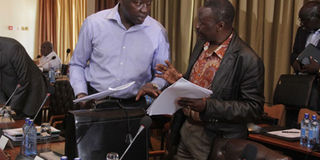There is a window yet to remedy laptop project

PHOTO | FILE |JOSEPH KANYI Energy and Petroleum Cabinet Secretary Davis Chirchir, left, and his Principal secretary Eng Joseph Njoroge. Kenyan companies are missing out on business opportunities in the oil and gas industry because the existing legislation does not compel global giants to source for local skills, goods and services.
What you need to know:
- Having a technology-savvy generation of Kenyans in future would be a major achievement. Nevertheless, it is important to examine our current realities so that the government can maximise the benefits of this noble initiative.
- Has government considered putting up computer laboratories in public and primary schools as an alternative? A laptop per child is a very expensive way of developing such useful digital talent.
During the launch of its manifesto ahead of the March 2013 election, the Jubilee coalition committed itself to supply every child entering standard one with a laptop within its first 100 days in office.
In his words, Uhuru Kenyatta stated: “We shall sustain this programme for each succeeding year until the day when every child in the country will walk with a satchel and a laptop.”
Having a technology-savvy generation of Kenyans in future would be a major achievement. Nevertheless, it is important to examine our current realities so that the government can maximise the benefits of this noble initiative.
According to the 2014 Economic Survey, there are 19,848 public primary schools, and last year 1.6 million children were enrolled in class one. Going by these figures, eight million laptops will have to be provided over the next eight years. If, for the first year, the government is meant to spend Sh17.4 billion (down from the initial Sh24.6 billion) to fund the project, in the long-term, we should expect a huge investment of between Sh140 billion and Sh224 billion. The cost of each laptop, according to the Ministry of Education, is Sh28,000.
While the overall project sounds attractive to ordinary citizens, some important issues need to be clarified.
• Just how prepared are schools in terms of infrastructure: electricity, classroom space, and storage? During the Cabinet secretaries’ retreat in Nanyuki, Energy Cabinet Secretary Davis Chirchir stated that only about half of all primary schools have power, but that they will be connected to the national electricity grid by the end of the next financial year.
This is the danger of political manifestos; they sometimes promise more than can realistically be achieved. As a result, we are witnessing a crash programme to beat a politically self-imposed deadline rather than implementation of a sound policy project.
• In what language will the software used as the medium of instruction be? Using English would conflict with the new policy floated by the Ministry of Education requiring teachers to teach children under the age of eight in their mother tongues.
• Has government considered putting up computer laboratories in public and primary schools as an alternative? A laptop per child is a very expensive way of developing such useful digital talent.
• What sort of security measures will be instituted to ensure minimal loss (through breakage, theft, fires or flooding) of the laptops? And when losses occur, under what circumstances would the school or headmaster/student/parents be held responsible?
• How will the resultant electronic waste be handled? What monitoring and evaluation system will be put in place to evaluate the impact of this technology on educational performance/mental development?
• How soon can the teachers be trained, how many will be selected for such training, and what will be the basis of that?
Perhaps some of these questions have already been answered, but the answers have not been shared with the public.
In a survey conducted by Ipsos (formerly Synovate) between February 8 and 15, 2014, respondents with school-age children were asked about laptop computer project preparedness in terms of electricity, classroom (space/desks), and secure store rooms. Their responses were similar to Mr Chirchir’s.
According to the survey, only 44 per cent of the households said their schools had electricity while 43 per cent said the schools have secure rooms.
On a positive note, however, 62 per cent of respondents said their childrens’ schools are ready to receive the laptops in terms of classroom space/desks. But the fact that 38 per cent have children in ill-equipped schools raises a major question about the government’s priorities.
In a separate survey of 2,000 respondents conducted between April 28 and May 7, 2014, Kenyans were asked to state a preference between the laptop project and a computer laboratory for the whole school. Eighty per cent preferred building a computer laboratory that would benefit all pupils.
LITMUS TEST
For a government that talks about austerity and efficiency, this is a litmus test. Campaign promises are meant to entice voters but when the election noise is over, however, a serious government must sober up and base its policies on the realities of the day.
In this case, the government should consider telling the public: “Look, we have carefully examined the situation on the ground and believe that the objective of this policy can be achieved through a different mechanism.”
The fact that the original tender for supply of the hardware has been called back on grounds that procurement procedures may have been violated, gives the government a perfect opportunity to demonstrate that it cares just as much about practical implementation as it did about campaign promises.
The writer is a public affairs researcher at Ipsos Kenya Limited. Views expressed are his own. E-mail: [email protected] Twitter: @Victor_Rateng





